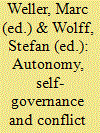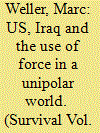|
|
|
Sort Order |
|
|
|
Items / Page
|
|
|
|
|
|
|
| Srl | Item |
| 1 |
ID:
068297


|
|
|
|
|
| Publication |
London, Routledge, 2005.
|
| Description |
xi, 276p.
|
| Standard Number |
0415339863
|
|
|
|
|
|
|
|
|
|
|
|
Copies: C:1/I:0,R:0,Q:0
Circulation
| Accession# | Call# | Current Location | Status | Policy | Location |
| 051005 | 320.15/WEL 051005 | Main | On Shelf | General | |
|
|
|
|
| 2 |
ID:
083998


|
|
|
|
|
| Publication |
2008.
|
| Summary/Abstract |
The Ahtisaari comprehensive proposal for a settlement of the status of Kosovo met with deadlock in the UN Security Council. It would neither be endorsed nor imposed upon the parties. In view of that position, a new round of negotiations, conducted by the EU, Russia and the US, was launched over a period of 120 days. During these discussions, Serbia's President Boris Tadic revealed a significant measure of flexibility when putting forwards options for wide-ranging self-government for Kosovo. However, these forward-looking positions were undermined by a less advanced proposal emanating from other parts of the Belgrade government, including the Prime Minister. Moreover, the Serbian parliament sought to preempt developments by unilaterally adopting its own constitutional amendments relating to Kosovo, further undermining the credibility of Serbia's position at the international level. However, it could be argued that had Belgrade been willing to begin the previous round of negotiations let by Martti Ahtisaari with the advanced offers it was putting at the very end of the process, a different outcome might have resulted. Such action might have put pressure on western governments to impose an advanced autonomy settlement on Kosovo, rather than putting Belgrade under pressure to accept the Ahtisaari plan. In the end, Kosovo's independence was unilateral in two senses. On the one hand, Kosovo declared independence without the benefit of agreement from Belgrade or cover from the UN Security Council. On the other hand, Kosovo unilaterally accepted the provisions emanating from the Ahtisaari talks. These concessions had been made in the expectation that agreed independence would be forthcoming in return. Belgrade was therefore able to oppose independence and work against its consolidation, while profiting from Kosovo's agreement to the plan it had rejected.
|
|
|
|
|
|
|
|
|
|
|
|
|
|
|
|
| 3 |
ID:
065625


|
|
|
| 4 |
ID:
083072


|
|
|
|
|
| Publication |
2008.
|
| Summary/Abstract |
The Vienna negotiations on the final status for Kosovo were an impossible project. It was clear at the outset that both parties would not be able to find common ground on the status issue. However, the talks focused on the practical issues of governance in Kosovo, such as decentralization, community rights and cultural heritage. It was thought that these could be addressed, initially at least, in a status-neutral way. While the parties did not manage to agree on all or most of these problems, the UN Special Envoy, Martti Ahtisaari, generated a comprehensive proposal offering compromise solutions that should have been acceptable to both sides. The recommendation of the Special Envoy in favour of supervised independence was deliberately separated from the comprehensive proposal. It was thought that the UN Security Council would at least endorse the proposal, even if it was ultimately unwilling to pronounce itself in favour of independence. The issue of status might then be settled outside the Council. However, when it appeared to some states on the Council that endorsement of the substantive Ahtisaari plan would in fact be tantamount to acceptance of independence, this avenue was closed.
|
|
|
|
|
|
|
|
|
|
|
|
|
|
|
|
|
|
|
|
|